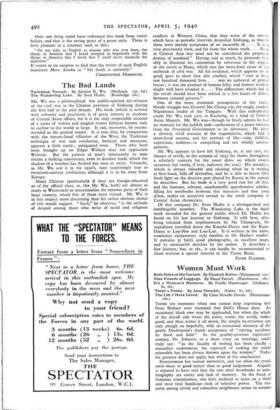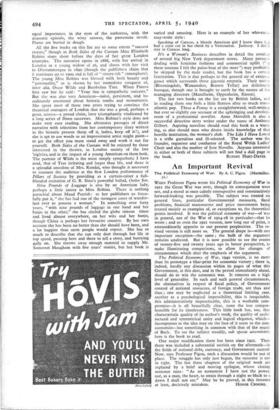Women Must Work
Three a Penny. By Anne Meredith. (Faber. Rs. 6d.) THERE are moments when one cannot help regretting that Nora Helmer ever slammed that Doll's House door. An occasional black ewe may be applauded, but when the whole of the distaff side wears the pants, roams the world, makes good, and then writes it all down, The simple he-reviewer can only plough on hopefully, with an occasional memory of the gentle Desdemona's dumb acceptance of " moving accidents by flood and field." In the grubby-glorious eighteenth century, Dr. Johnson, in a short essay on marriage, could truly say : " as the faculty of writing has been chiefly a masculine endowment, the reproach of making the world miserable has been always thrown upon the women." Today his premise does not apply, but what of his conclusion?
Everywoman has turned memoirist, and too often the result owes more to good nature than to good judgement. Asquith is reputed to have said that the two chief drawbacks to auto- biography are vanity and lack of memory. In the flood of feminine reminiscence, one feels inclined to insist on a third and most fatal handicap—lack of selective power. The tea- party among trivial and colourless neighbours seems to assume equal importance, in the eyes of the authoress, with the dramatic episode, the witty answer, the passionate revolt. Plums are buried in dough.
All the five books on this list are to some extent " success stories," though in Both Sides of the Curtain Miss Elizabeth Robins stops short before the days of her great London triumphs. The narrative opens in 1888, with her arrival in London as a young widow of 26, and closes with her visit to Oberammergau in 1890 (though the publishers claim that continues up to 1900 and is full of " ninety-ish " atmosphere). The young Miss Robins was blessed with both beauty and " personality," as is shown by her immediate conquest of, inter aria, Oscar Wilde and Beerbohm Tree. When Pinero first saw her he said : "Your line is sympathetic outcasts." But she was also very American—naive, persistent, and in- ordinately emotional about historic tombs and monuments. She spent most of these two years trying to convince the theatrical managers of London that she was a good, perhaps a great, actress—a proud claim, later triumphantly vindicated by a long series of Ibsen successes. Miss Robins's style does not make very easy reading. She alternates passages of direct narrative with selections from her contemporary diary written in the historic present (keep off it, ladies, keep off it!), and she is apt to use words as an impressionist artist might paint— to get the effect you must stand away and work it out for yourself. Both Sides of the Curtain will be enjoyed by those interested in the theatre, in London society of the late 'eighties, and in the impact of a young American on them both. The portrait of Wilde is the most simply sympathetic I have read, that of Tree irritating and larger than life, and there is a splendid anecdote of Mrs. Kendal, who thought it necessary to reassure the audience at the first London performance of Pillars of Society by providing as a curtain-raiser a full- blooded recitation of G. R. Sims's powerful ballad, Ostler Toe.
Nine Pounds of Luggage is also by an American lady, perhaps a little junior to Miss Robins. There is nothing parochial about Maud Parrish : as her publishers so force- fully put it, " she has had one of the strongest cases of wander- lust ever to possess a woman." In something over forty years, " with nine pounds of luggage in one hand and her banjo in the other," she has circled the globe sixteen times and lived almost everywhere, on her wits and her banjo, though China is perhaps her favourite country. By her own account she has been no better than she should have been, and a lot happier than most people would expect. She has so much to describe that she can only dart through her life at top speed, pausing here and there to tell a story, and hurrying gaily on. She throws away enough material to supply Mr. Somerset Maugham with five years' stories, but her book is varied and amusing. Here is an example of her who-runs- may-write style : Speaking of Caracas, a blonde American girl I knew there had had a cross cut in her cheek by a Venezuelan. jealousy. I didn't stay in Caracas long.
It's a Woman's Business describes in detail the conduct of several big New York department stores. Many passag.:s dealing with feminine fashions and commercial uplift (" at these sessions I felt the pulse-beat of the store ") may profitably be skipped by the male reader, but the book has a certain fascination. This is due perhaps to the general air of extrava- gance which surrounds these gigantic emporia. Their names (Bloomingdale, Wanamaker, Bonwit Teller) are deliciously baroque, though one is brought to earth by the names of. the managing directors (Mundheim, Oppenheim, Simon).
The last two books on the list are by British ladies, and in reading them one feels a little flatness after so much trans- atlantic pep. Three a Penny is a straightforward, well-written but ever so slightly coy account of the upbringing and develop- ment of a professional novelist. Anne Meredith is also a successful detective story writer under the name of Anthony Gilbert. Aspiring novelists should read this book as a warn- ing, as also should men who desire inside knowledge of that horrific institution, the woman's club. The Life I Have Loved is a trifle garrulous and ill-selected. The author was the founder, organiser and conductor of the Royal Welsh Ladies' Choir and also the mother of Ivor Novell°. Anyone interested in either or both of these subjects will not find a dull page in















































 Previous page
Previous page